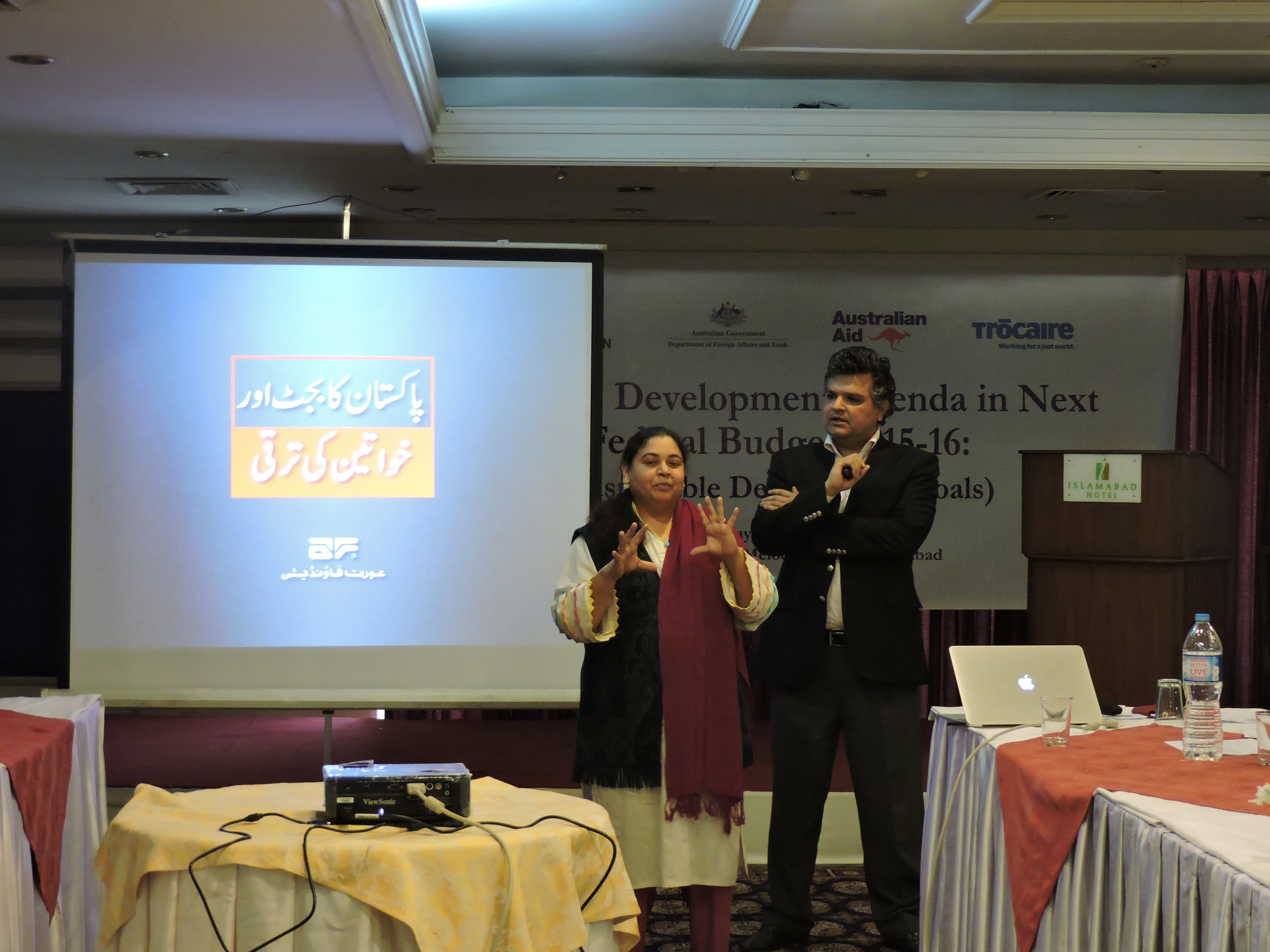
10-03-2015
Islamabad
Parliamentarians should lobby for a ‘Gender Budget Statement’
Parliamentarians should lobby and recommend to the government to present ‘Gender Budget Statement’ as part of the Budget Books, which shall highlight the amounts allocated for women development. This was realized during a a study circle on ‘Women`s Development Agenda in Next Federal Budget 2015-16 in line with UN MDGs/SDGs’, with parliamentarians and civil society representatives. The event was organized by Aurat Foundation on March 10, 2015, at Islamabad Hotel.
Mr Nohman Ishtiaq, Expert / Consultant-Public Financial Management, delivered a detailed presentation on ‘Women’s Development Agenda in upcoming Budget 2015 – 2016’. Ms Uzma Zarin, Director Programmes, Aurat Foundation, coordinated the study circle and the question hour session.
Measuring women’s development in Pakistan, the Annual Gender Gap Index 2014 report, published by World Economic Forum, shows that Pakistan ranked at 141 out of 142 surveyed countries. The rank measures four key areas: in economic participation and opportunity Pakistan ranks at 141; in education Pakistan ranks at 132; in health and survival Pakistan ranks at 119; in political empowerment – Pakistan ranks at 85. The figures show that women’s economic empowerment, children’s schooling and health are the most under-budgeted sectors.
Analyzing the budget making process reference women’s development, Mr Ishtiaq said that the government does not have any figures that how much budget would be spent on women’s welfare and rights in any coming budget, hence we had to dig down such information from many diverse sources.
Whereas the rules do allow parliamentarians to conduct oversight at the budget execution stage. Rule 166(4) of the rules of procedures and conduct of business in the Senate which state: “A Committee may examine suo moto the expenditures, administration, delegated legislation, public petitions and policies of the Ministry concerned and its attached corporations and public bodies and may call for views of the Ministry. After examining the views of the Ministry, the Committee shall make a report to the Senate, which may make such recommendations thereon as it may deem fit.”
Mr Ishtiaq also linked the budget allocations for women’s development with Pakistan’s commitments which it made to UN through conventions and treaties signed e.g. Convention on the Elimination of all forms of Discrimination Against Women (CEDAW), The International Convention on the Elimination of All Forms of Racial Discrimination (ICERD), The International Covenant on Civil and Political Rights (ICCPR), The International Covenant on Economic, Social and Cultural Rights (ICESCR), The Convention on the Rights of the Child (CRC), The Convention against Torture and Other Cruel, Inhuman or Degrading Treatment or Punishment (CAT), International Convention on the Rights of Persons with Disabilities (ICRPD), BPfA is an international declaration of women’s rights set up at the UN’s World Conference on Women, held in Beijing in 1995, BPfA covers 12 key critical matters of concern and areas for action including women and poverty, violence against women and access to power and decision-making.
Ms Nafeesa Khattak, from PTI, putting the examples of foreign countries where local governments generate their own revenue from e.g. car parking etc., questioned that if our local governments have their own revenue generation base or depends on federal and provincial governments?
Ms Naseema from Pakhtunkhwa Mili Awami Party (PKMAP), while appreciating the study circle, said that legislators from Balochistan need such information and training that how to get involve in the budget making process at provincial as well as federal level.
The government and women’s rights organizations need to analyze the situation of women and girls in a given sector e.g. health, education, and assess whether budget allocations are adequate, in order to implement gender-responsive policies. This must be followed by an assessment of the outputs of these allocations in order to evaluate how resources are actually spent, and policies and programmes implemented, Mr Ishtiaq said.
Pakistan’s project planning, budgeting and monitoring processes are mostly gender blind – i.e. it is not possible to assess whether projects, schemes have gender element, how much budget is being allocated for women and girls, how much budget was actually spent and whether it has improved lives of women and girls.
Mr Naeem Mirza, COO Aurat Foundation, in his closing remarks, emphasized that concerned government institutions and civil society organizations shall focus more on resource allocations rather than direct but isolated service delivery at village level like road construction etc. Pointing to women’s centuries old deprivation from, and men’s control over, basic resources like land, forests etc., he emphasized that equal access of men and women to natural resources is essential for national development and progress. |

